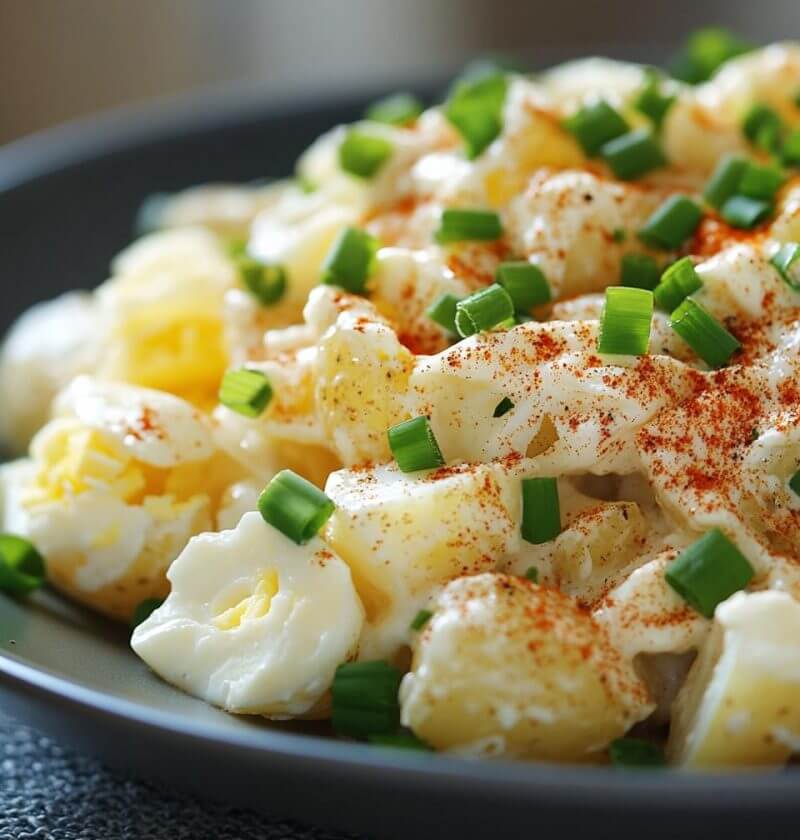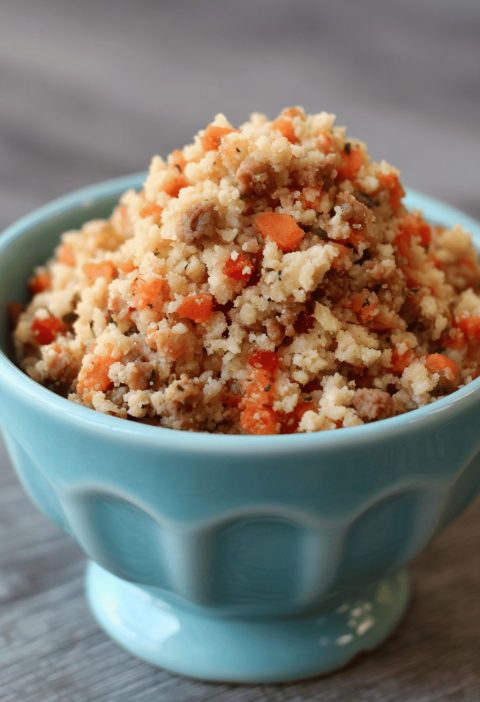Would you like to save this?
Potato salad: a comforting, creamy side dish that’s been a staple at family gatherings, BBQs, and potlucks for generations. Yet, lurking beneath its mayonnaise-laden surface is a controversial question that divides food lovers everywhere: Should mustard be allowed anywhere near potato salad?
If you’re firmly in the “no mustard” camp, you’re not alone. For many of us, mustard in potato salad feels like an intrusion on tradition—a bold, brash ingredient that overpowers the delicate, creamy balance that makes this dish so comforting. Let’s dive into the reasons why mustard doesn’t belong in potato salad and why we should stick to the classic recipe that has stood the test of time.
1. Respect the Traditional Recipe
Traditional potato salad is a celebration of simplicity. At its core, it’s a harmonious blend of boiled potatoes, mayonnaise, hard-boiled eggs, a touch of celery or onion, and maybe a dash of salt and pepper. This classic combination has been passed down through generations for good reason: it’s balanced, creamy, and comforting.
Introducing mustard into this delicate mix feels like a betrayal of tradition. It’s a loud, tangy flavor barging into a dish that’s meant to be mild and mellow. While experimenting in the kitchen is fine for other recipes, some dishes—like grandma’s potato salad—deserve to be left just as they are.
2. Mustard Overpowers the Creamy Flavor
Potato salad is all about balance. The starchy softness of the potatoes blends seamlessly with the rich creaminess of mayonnaise, while subtle hints of onion or celery add just the right amount of crunch and zest. Mustard, however, is a bold, assertive flavor that can completely hijack the dish.
Instead of the smooth, delicate profile we’ve come to love, mustard shouts, “Look at me!” It brings a tang that can overshadow the other ingredients and turn what should be a harmonious side dish into a jarring flavor clash.
3. Texture Troubles: From Creamy to Gritty
Let’s talk texture. One of the hallmarks of a great potato salad is its luscious, creamy consistency. The potatoes are soft yet firm, the mayonnaise is silky, and the mix-ins provide just a hint of crunch.
Adding mustard, especially whole-grain or spicy varieties, disrupts that smoothness. The gritty or vinegary quality of mustard can make the salad feel uneven or tangy in a way that’s less than pleasant. And let’s not even get started on the neon yellow hue that some mustard varieties add—goodbye, appetizing presentation!
4. The People Have Spoken: No Mustard, Please
When it comes to potato salad preferences, the data doesn’t lie. Polls and surveys consistently show that most people prefer their potato salad without mustard. Why? Because they want the comforting, creamy dish they grew up with—not a tangy surprise.
In fact, many die-hard traditionalists see mustard as an unwelcome modern twist, something added to appease foodies who can’t resist tinkering with a classic. If the majority of people agree that potato salad is better without mustard, maybe it’s time to respect the will of the crowd.
5. Keep It Simple: The Beauty of Tradition
Food traditions carry with them nostalgia, comfort, and history. Potato salad is one of those dishes that brings people together—whether it’s on the picnic table or at a holiday spread. Its traditional flavor profile is part of its charm.
Adding mustard can feel like overcomplicating something that doesn’t need fixing. Traditional potato salad doesn’t need an “upgrade” or a bold twist to make it exciting. It’s delicious precisely because it’s simple, creamy, and familiar.
The Case for (and Against) Mustard: Addressing the Other Side
Now, we’d be remiss not to acknowledge that some people do enjoy mustard in their potato salad. They argue that it adds tanginess, sharpness, or complexity to an otherwise mild dish. But here’s the thing: there are already so many tangy, acidic ways to add flavor to potato salad that don’t involve mustard.
- Vinegar or Pickle Juice: Want a hint of tang? A splash of white vinegar or a drizzle of pickle juice will do the trick without overpowering the salad.
- Dijon as a Small Accent: If you absolutely must add mustard, a tiny dollop of Dijon can bring subtle depth without overwhelming the dish.
- Fresh Herbs: Chopped dill, parsley, or chives add brightness without disrupting the creamy balance.
So, yes, mustard can work in moderation for those who prefer a sharper flavor. But for the purists among us, it’s an unnecessary addition that muddies the waters of an otherwise perfect dish.
What the Experts Say
Culinary experts and home chefs alike tend to agree that mustard is not a requirement for great potato salad. Legendary chefs like Julia Child and Ina Garten, known for their respect for traditional recipes, champion versions of potato salad that let the natural flavors of the ingredients shine.
Ina Garten’s recipe, for example, relies on high-quality potatoes, a creamy mayonnaise dressing, and fresh dill for flavor—no mustard in sight. This approach respects the simplicity of the dish while allowing room for personal touches, like pickles or a splash of vinegar, that don’t overwhelm the salad.
Final Thoughts: Leave Mustard Out
At the end of the day, potato salad is a deeply personal dish, and everyone has their own idea of what makes it “perfect.” But if you’re asking me (and many others out there), mustard has no place in this classic recipe. Its bold, tangy flavor disrupts the creamy harmony, its texture detracts from the smoothness, and it breaks the unspoken rule of honoring tradition.
If you love mustard, go ahead and enjoy it—but maybe save it for your hot dogs, sandwiches, or deviled eggs. When it comes to potato salad, let’s keep it simple, classic, and mustard-free.
So, who’s with me? Let’s preserve the creamy, comforting goodness of traditional potato salad and keep mustard far away from this beloved dish!







